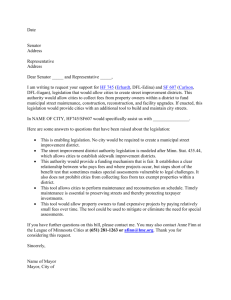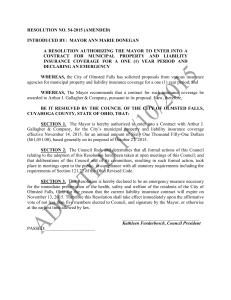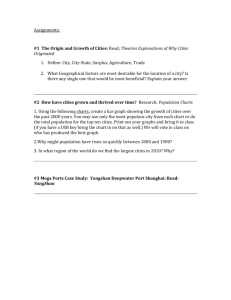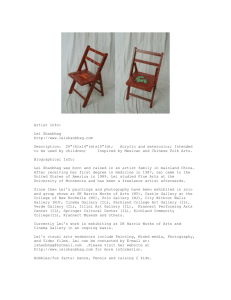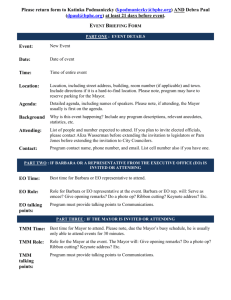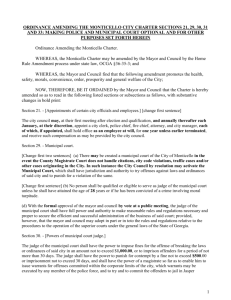Illegals Under Cover
advertisement
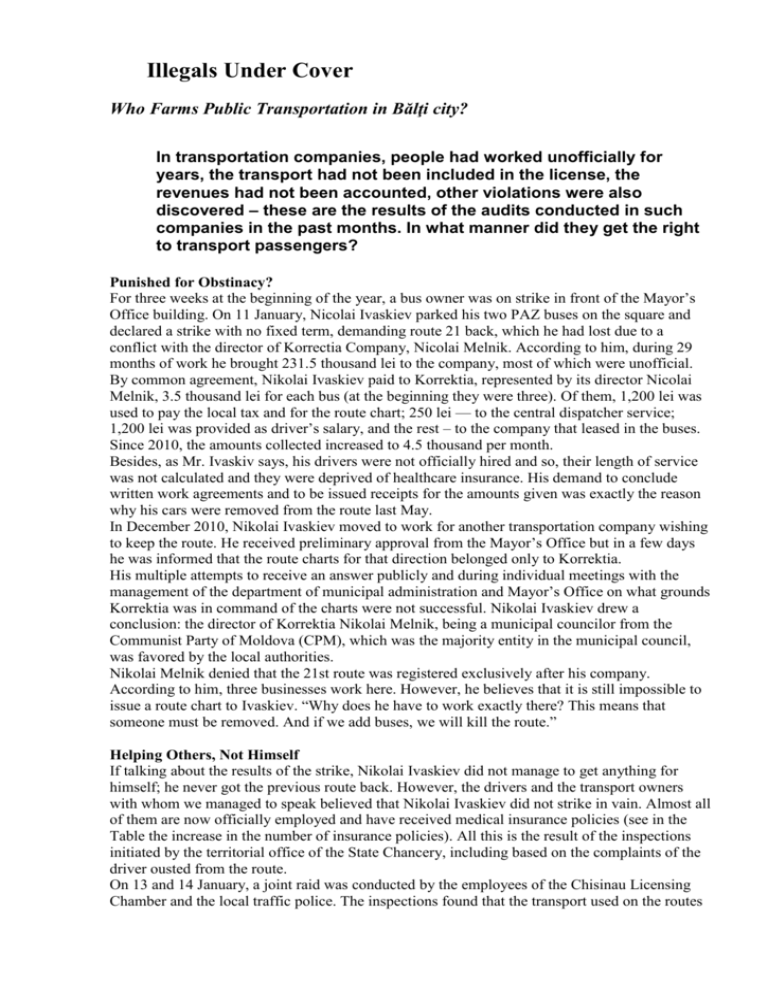
Illegals Under Cover Who Farms Public Transportation in Bălţi city? In transportation companies, people had worked unofficially for years, the transport had not been included in the license, the revenues had not been accounted, other violations were also discovered – these are the results of the audits conducted in such companies in the past months. In what manner did they get the right to transport passengers? Punished for Obstinacy? For three weeks at the beginning of the year, a bus owner was on strike in front of the Mayor’s Office building. On 11 January, Nicolai Ivaskiev parked his two PAZ buses on the square and declared a strike with no fixed term, demanding route 21 back, which he had lost due to a conflict with the director of Korrectia Company, Nicolai Melnik. According to him, during 29 months of work he brought 231.5 thousand lei to the company, most of which were unofficial. By common agreement, Nikolai Ivaskiev paid to Korrektia, represented by its director Nicolai Melnik, 3.5 thousand lei for each bus (at the beginning they were three). Of them, 1,200 lei was used to pay the local tax and for the route chart; 250 lei — to the central dispatcher service; 1,200 lei was provided as driver’s salary, and the rest – to the company that leased in the buses. Since 2010, the amounts collected increased to 4.5 thousand per month. Besides, as Mr. Ivaskiv says, his drivers were not officially hired and so, their length of service was not calculated and they were deprived of healthcare insurance. His demand to conclude written work agreements and to be issued receipts for the amounts given was exactly the reason why his cars were removed from the route last May. In December 2010, Nikolai Ivaskiev moved to work for another transportation company wishing to keep the route. He received preliminary approval from the Mayor’s Office but in a few days he was informed that the route charts for that direction belonged only to Korrektia. His multiple attempts to receive an answer publicly and during individual meetings with the management of the department of municipal administration and Mayor’s Office on what grounds Korrektia was in command of the charts were not successful. Nikolai Ivaskiev drew a conclusion: the director of Korrektia Nikolai Melnik, being a municipal councilor from the Communist Party of Moldova (CPM), which was the majority entity in the municipal council, was favored by the local authorities. Nikolai Melnik denied that the 21st route was registered exclusively after his company. According to him, three businesses work here. However, he believes that it is still impossible to issue a route chart to Ivaskiev. “Why does he have to work exactly there? This means that someone must be removed. And if we add buses, we will kill the route.” Helping Others, Not Himself If talking about the results of the strike, Nikolai Ivaskiev did not manage to get anything for himself; he never got the previous route back. However, the drivers and the transport owners with whom we managed to speak believed that Nikolai Ivaskiev did not strike in vain. Almost all of them are now officially employed and have received medical insurance policies (see in the Table the increase in the number of insurance policies). All this is the result of the inspections initiated by the territorial office of the State Chancery, including based on the complaints of the driver ousted from the route. On 13 and 14 January, a joint raid was conducted by the employees of the Chisinau Licensing Chamber and the local traffic police. The inspections found that the transport used on the routes had been reequipped from freight transport, which was forbidden by a government decision of 2006 and which had to be taken out of the city routes by the end of 2007. Besides, 25 of the 50 buses inspected did not have attachments to their licenses, i.e. they were not entered in the general license and were not entitled to conduct transportation, while 15 of them did not have the full set of documents. On 26 January, the Licensing Chamber issued a decision and recognized the licenses of the transporters as invalid. Those companies had a certain number of transport units indicated in their general licenses whereas route charts had been issued to a much higher number. In particular, the Serviciul Tehnic declared four units but was in fact operating 22 units; VanFoltur had 2 units in its declaration but 10 units in fact; Iursenia-Trans — 3 (+6), Korrektia — 5 (+20), Association for Protection of Transporters Rights and Interests (APTRI) — 9 (+15). By the end of January, all those transporters executed the directions of the Licensing Chamber, presented their declarations and received new licenses where all factual working transport was entered. At the same time, the Tax Inspectorate started to check the company’s financial operations and the Labor Inspectorate – the company’s compliance with the labor law. The labor inspectors checked 7 transport companies and found violations in all of them, such as lack of work agreements, lack of work books, size of salaries did not comply with the legal requirements (not lower than 1,100 Lei), or salaries were not paid as established by the law, with the respective entries in the accounting registries. As a result, reports on violations in the area of labor protection were prepared against all the company managers and filed with the court so that to hold them administratively liable under Art. 55 (p.1) of the Code for Contraventions, which provides for a fine of 50 to 75 conventional units (1,000—1,500 Lei). The director of Korrektia, Nikolai Melnik, was also reported against under Art.57 (p.1) for violations of the timeframe for payment of salaries and contributions to the social fund and healthcare funds (for such violation, a fine of 100 to 200 conventional units is provided). The Tax Inspectorate checked 13 transport companies (not just the passenger transporters) and also found in all of them violations of the Tax Code, of the Accounting Law, and of other legal acts. As a result, the Inspectorate calculated that there should be paid 123.3 thousand Lei in taxes, 29.5 thousand in penalties, 930.2 thousand Lei in fines, and others. Overall, the state treasury was replenished by 1,152,100 Lei. Order Made, Problem Solved? At present, the bus owners pay 2,650 to 3,800 Lei per month to the transport companies. They used to pay 2,350 to 3,200 Lei. It is not difficult to calculate how much of this amount represents the local tax, the route chart and the dispatcher’s services (see the certificate) – they account for half of the amount. The rest goes for the companies’ services. The rates increased after the recent inspections and the bus owners believe it happened so that to compensate for the losses incurred due to the fines imposed. In addition, as we were told on the condition we kept the source anonymous, the managers of four of the five ‘injured’ companies concluded an agreement to increase the rates all at the same time and if the transport owners objected and wanted to leave a company, then the other companies committed to not accept them. Many of the bus owners wondered why they could not work independently and went to the mayor’s office, department for municipal administration, wishing to obtain a work permit. It is the mayor’s office that through its departments directly administers the transportation process. But they were refused. At the first, the refusal was indirect; they were explained how complicated and unprofitable it was for small companies to run such a business and how they would not be able to respect all the conditions for obtaining licenses, etc. Novices were suggested to join the already existing companies, first of all Korrektia (this is how Nikolai Ivaskiev joined it with his buses), while the more experienced ones – to remain where they were. And if someone insisted and attempted to prove their competence, they were directly refused. No, Because… No We have got a hold of applications of various entities for a route. Starting with 2005, official letters signed by the ex-mayor Vasilie Panchuk and ex-deputy mayors Yurii Pahomeko and Igor Neaga, have said the following: “The passenger transportation scheme is filled up. We do not intend to create new routes and are not in need of additional transport companies.” Such answers were received both by young companies and by the Balti Bus Park (BBP) that had been in operation for a long time. Veaceslav Zinkovski, head of the department for municipal administration, was even more categorical in one of its letters: “There are no reasons for withdrawing and redistributing the schedule of routes among partners with positive recommendations.” For instance, Larisa Griza held correspondence with the mayor’s office for a year and a half. She and her son responded to an announcement posted by the mayor’s office (!) for business companies that wished to work on the new route No. 19, opened a company, received a license and… nothing more. Each their letter received a new reason for refusal in reply – unwillingness to work with small companies (allegedly this would have a negative impact on the transportation process as a whole); manager’s lack of experience; lack of own material-technical base, or lack of a doctor or mechanic. The fact that the law provides for having either one’s own base or a servicing agreement with a service company was not taken into account. But it was exactly on such grounds, of having such an agreement, that the Licensing Chamber issued a license to Griza. The BBP that has had experience of many years but also a material-technical base and a full staffing of all necessary positions has not had access to the city passenger transportation for 10 years. At the meeting of the Municipal Council of 2 March, the question of the company’s representative about the reasons for the refusal was answered by the mayor’s office representative Octavian Mahu in such way: in the 90s, this company left the city without bus communication, and so the private companies came in place of that bus park and saved the situation. The BBP director Aurel Neghina rejects the allegations of having betrayed the city’s interests: “In the 90s, we also carried persons entitled to benefits and discounts, as the Trolleybus Unit did. However, the mayor’s office paid back each year only to the Trolleybus Unit the money spent on carrying such persons, whereas the bus park did not get anything. This was the stumbling block between the mayor’s office and the bus park. (...) The mayor’s office debts to the BBP amounted to 500 thousand Lei by 1999.” Disloyal Competition with Illegals Although the Tax Inspectorate claims that the damages caused to the budget are minimal because between 2008 and 2010 the income tax rate was zero and this type of activities was exempted from the VAT, still, there have been damages. If taking into account the minimal salary of 1,100 Lei and all the payments only from it (income tax — 7%; contributions to the social fund by the employer — 23%; contributions to the social fund by the employee — 6%; contributions to the mandatory healthcare insurance fund by the employer and the employee — 3.5% each), then the budget was short by about 420–470 Lei per month from each such salary (including or excluding the personal exemption). For a round figure, let us multiply this amount by 100 (although the official number of unemployed drivers and conductors was maybe even higher) and then by the number of months, and we get 504,000 to 522,000 Lei per year. Half a million Lei in the budget and 100 socially protected employees having the right to vacation, sick leaves and accumulation of length of service — you can judge by yourselves if this is much or little. There is also the second side of this issue. “The transport that works legally cannot develop at the same pace with the illegal one because the illegals do not incur the same costs as we do; we pay taxes on our salaries but they don’t. We have staff, keep track of the revenues, and check the transport and the drivers before each departure. And such costs account for more than 30% of the revenues,” Aurel Neghina says. Let us compare just two numbers. According to the official data, in 2008 alone, the BBP paid over 1.25 mlln lei in taxes on salaries of about 200 employees to the state treasury. At the same time, all city transporters taken as a whole, paid 5,835 mlln lei for three years (2008—2010) including the payments not just from salaries but also the local fees for transportation services (and this is the largest expenditure line) and other taxes, which accounts on the average for less than 2 mlln lei per year. Perhaps this is also due to the fact that in the period from 2007 to 2010 the Tax Inspectorate did not conduct scheduled inspections in transportation companies. Diktat and Arbitrariness Instead of Inspection? However, the Traffic Police raised an alarm. For half a year, the traffic police inspectors notified the local authorities about the need to take out of the routes the re-equipped transport as posing danger for the passengers and gave the mayor’s office the list of all ‘trucks’. However, their signals were ignored. At the SP request, the mayor’s office answered as follows: “All the passenger transport taking part in the municipal transportation has complied with the requirements for safe circulation. (...) The re-equipped units were gradually removed from the transportation process. By 1 January 2011, the entire reequipped transport had been excluded from the transportation process.” Why then for more than three years after the prohibition on using ‘trucks’ was issued they continued to circulate in the city? Especially that such buses could not even be included in the license. As the January inspection showed, these and other transportation means were not even declared in the license but they had route charts and certificates of compliance. Both documents are issued by the department for municipal administration of the mayor’s office. The management of the traffic police informs “The route charts and certificates of compliance of the transportation means were issued by the department for municipal management without checking the attachments to the license of each transportation unit. (...) Reequipped transport was permitted to carry passengers without the consent and verification by the traffic police department.” Moreover, the Deputy Head of the Territorial Office of the State Chancery Nikolai Unkuta thinks that such document as the certificate of compliance is not even established by the law. According to him, the Mayor’s Office illegally passed through the Municipal Council in 2007 a decision providing that the certificate of compliance would be the main document to entitle a company to transport passengers in the municipality. The BPP director adds “In my opinion, this certificate of compliance was established on purpose, in order to get round the law. The mayor’s office was not even checking the cars. They duplicated the extract from the general license and got round the license so that to admit any transport that was convenient to them. And the license is issued every five years whereas the certificate must be obtained each year, for each bus in part.” As far as Nikolai Uncuta heard, the cost of such a certificate amounted to 200 Euros. If taking into account the number of reequipped transportation units (over 40), which had been brought to Balti from the entire country then it becomes clear that the mayor’s office protects not the interests of the passengers and drivers but the interests of a system that it had created by itself, the Deputy Head of the State Chancery thinks. Will There Be A Contest? The tone of official letters changed when Octavian Mahu became mayor. Now the refusals of granting a route are accompanied by other reasons, at least more legally grounded: agreements on share participation with the current transportation companies have been signed for each municipal route in part. The shares have been determined and will not be redistributed until a tender will be organized, which is planned for June 2011. When and with whom were the agreements concluded, if they did not exist until the end of January? This was confirmed by the ex-Deputy Mayor Igor Neaga who acted as temporary mayor until 21 January and in whose subordination the department of municipal administration was. According to him, the issue about concluding agreements arose during a discussion with the ex-Mayor Vasilie Panchuk at the end of last year when Nikolai Ivaskiev started to complain. “I answered ‘We cannot do this because we have not held a tender. How can I argue that I have concluded an agreement with this or that company? There must be clear rules for the organization of transportation. And if there are no such rules but we conclude agreements, next day we will be staying before the prosecutor.” We called a number of companies that were found with violations during the inspections and asked if they concluded an agreement when obtaining their routes. No one could remember of such a document. Igor Neaga has doubts about whether a contest for assigning the routes will take place. First, because talks about this have taken place for about half a year, this topic comes up and then… is forgotten. Secondly, because it requires a lot of preparation and competence that he thinks the department does not have. “The tender documentation must specify everything: the route, how many stations, schedules, duration, and calculation of the passenger traffic. This in case a nonlocal company comes. There should be about 15 pages (...) If we live to see a tender organized, you will see that the requirements specification will be on two pages where nothing will be specified.” And if so, then there will again appear reasons to refuse granting transportation permits and grounds for the appearance of corruption schemes and misuse of power. *** A simple observation shows that neither reequipped buses nor unaccounted transport have disappeared from the street of Bălţi. Welded side doors, primitively welded seats and finally the inconvenient jut to the left from the entry (trace of the sliding door) against which you always hit your head — these are signs of the former “trucks” that are obvious to any passenger. For a few days in different places I wrote down the plate numbers of the buses driving by. Of 30 buses, four were not in the lists presented by the Licensing Chamber. Marina BZOVAYA This investigation has been produced with the support of the Danish Association of Investigative Journalists (FUJ).
